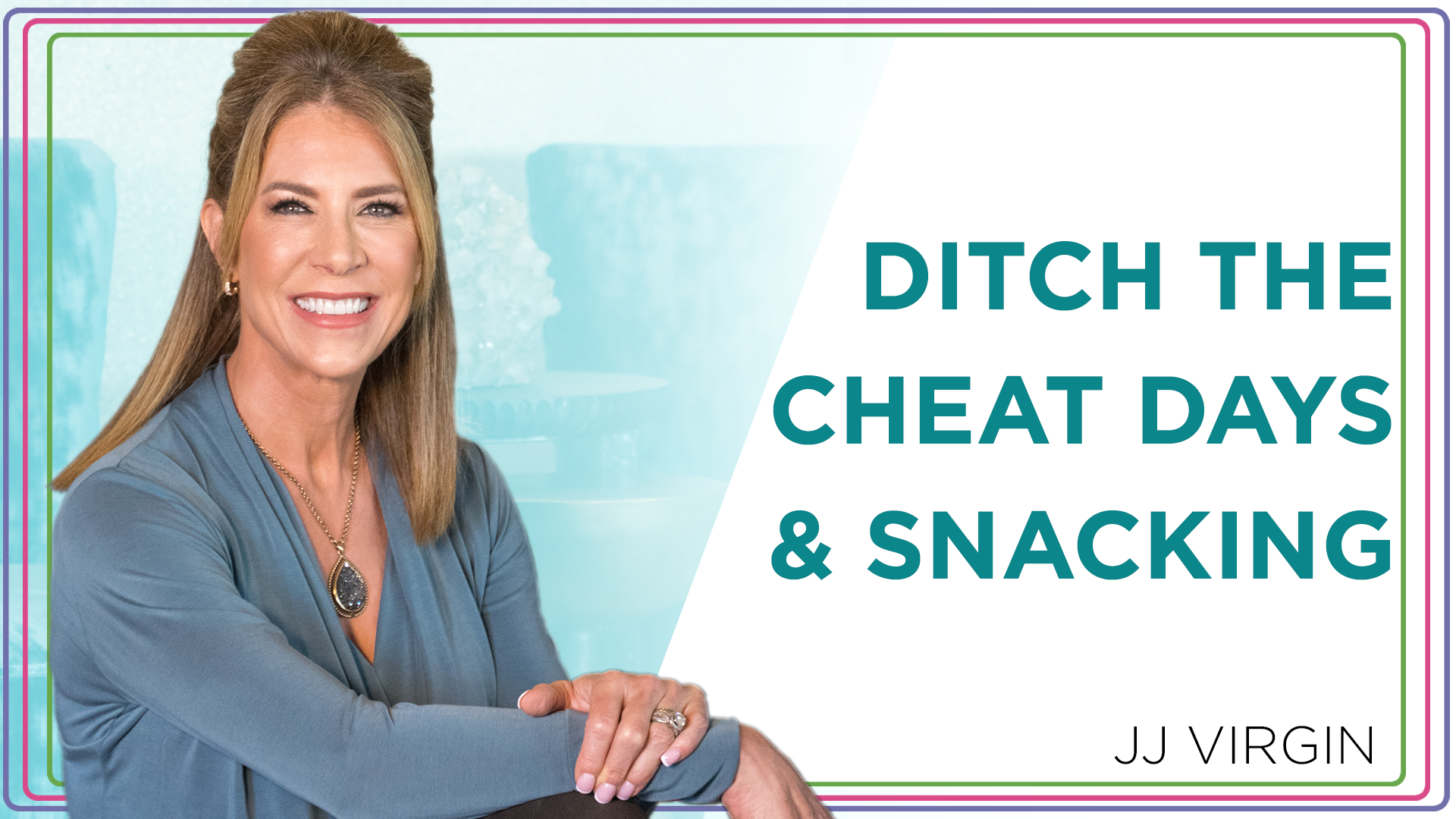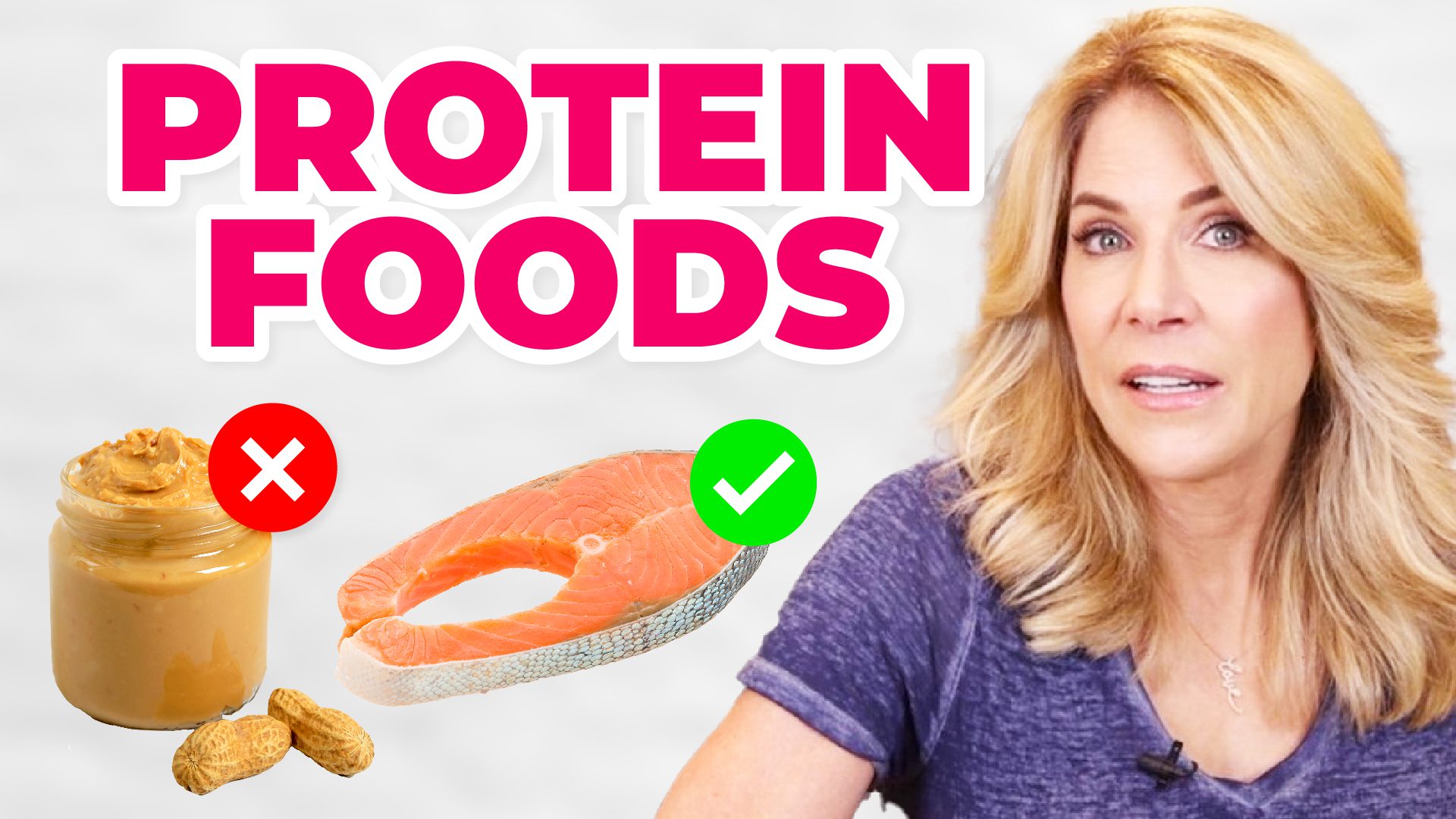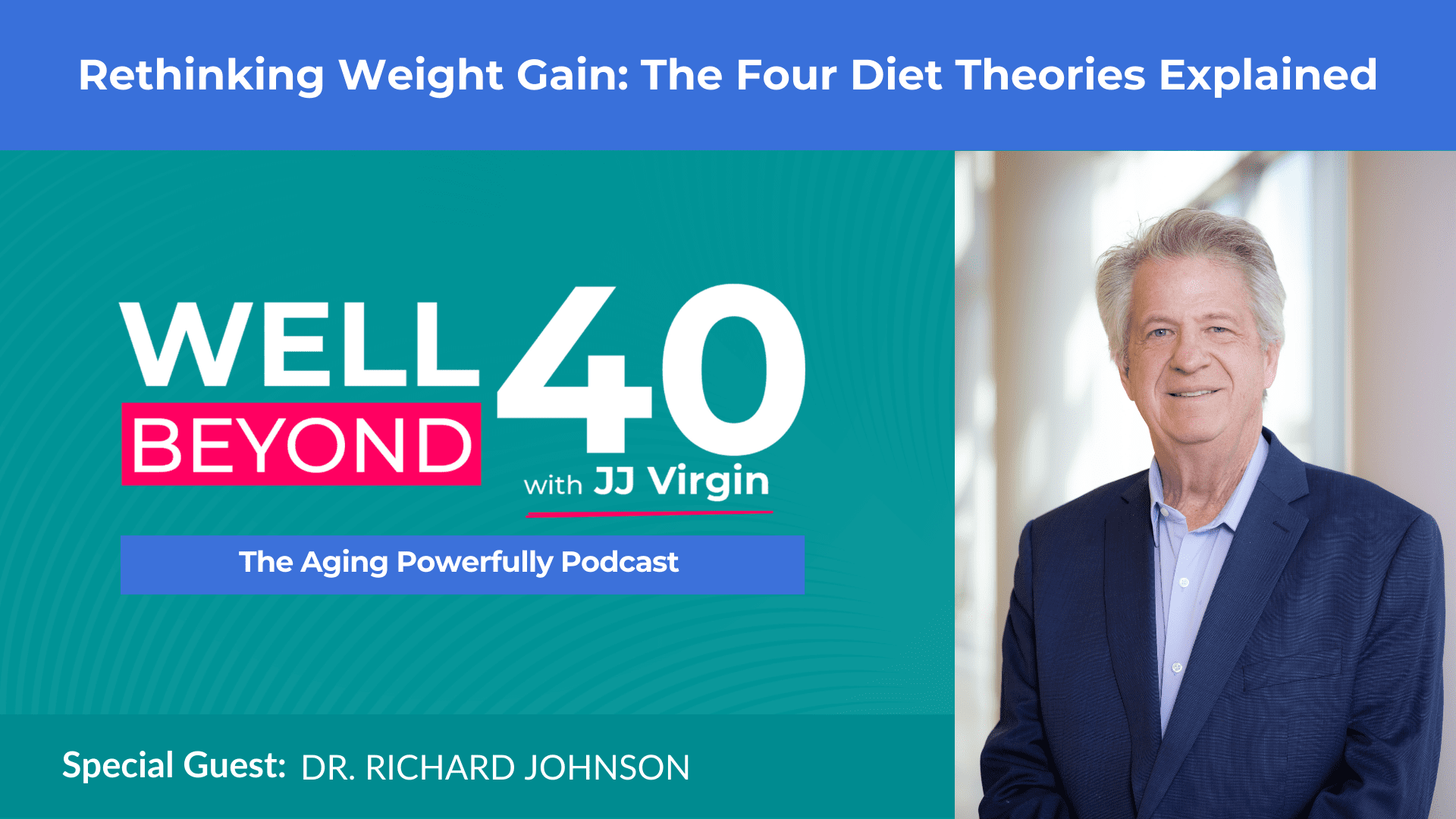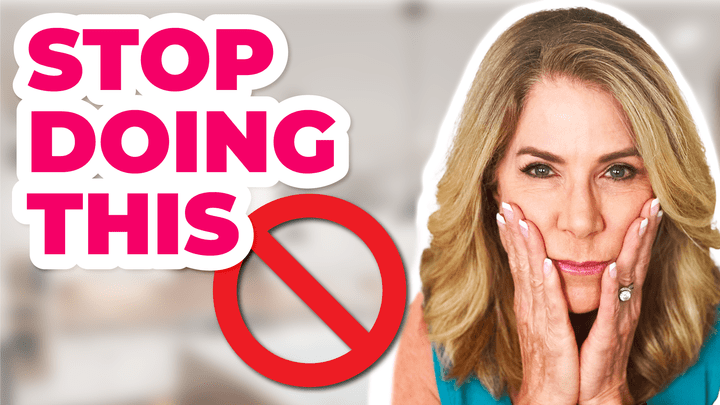Debunking Diet Myths to Lose Weight & Stop Weight Regain
Do you believe that healthy snacking or occasionally having a pizza and beer can help keep you on track with your diet plan? Then you’ll want to listen up to this podcast, where JJ talks about why snacking on even healthy foods and taking cheat days can raise blood sugar, shut off fat burning, and sabotage your health efforts. Here, she discusses why cheat foods have a drug-like effect on your brain and keep you hooked, the shocking study that showed bedtime snacking can nearly double your weight gain, and a simple solution to break the snacking habit. Plus, she reveals the simple overnight fasting hack that helps you burn fat, the #1 macronutrient to help curb hunger and cravings, and more. Whether you want to lose weight or break a weight loss plateau, this episode provides the tools you need to succeed.
Mentioned in this episode:
Watch the FULL VIDEO on JJ’s Youtube Channel
Listen up to understand insulin resistance
Learn simple swaps for your favorite foods
See why timing is everything with weight loss
Click here for more information and offers from our sponsors
ATHE_Transcript_Ep 450_YT 27
JJ Virgin: [00:00:00] Hey, this is JJ Virgin. Thanks so much for joining me. This is ask the health expert. In each episode, I put the power of health in your hands and share ways to get healthy, lose weight, heal your gut detox and lots more. So you can look and feel better fast if you'd rather watch the video. Hey, I did put on my makeup and do my hair.
So check it out on my YouTube channel.
You may think a little snack here or there is no big deal. But even munching baby carrots between meals can make a difference because it raises blood sugar and shuts off fat burning. Now, if that's hard for you to believe, stick around, I'm gonna show you why and teach you a better way. If you have any health goals, I'm gonna tell you why cheat [00:01:00] days and snacking are so bad for you and may keep you from reaching them and blow that myth about eating six small meals a day to boost your metabolism right out of the water.
You know, you hear so much about cheat days being good for you. Like on keto, it's really popular the problem with cheating though, aside from the fact. Who wants to be a cheater really is that first of all, it makes you feel really badly about yourself. And second, if you cheat, of course, you're really only hurting yourself.
So love yourself enough to take this advice to heart. Now, first. What do I mean by cheating, it means you're eating healthier, trying to stick to a diet, but decide that once a week or for one meal a day, or maybe for a whole day, you're gonna give yourself permission to break the rules. Now, the theory is that you're giving yourself a reward, so you're more likely to stick to your diet the rest of the time.
And so for that, You tell [00:02:00] yourself, you can have whatever you want to reset your metabolism and not feel deprived of your favorite foods, which are always the ones that are bad for you. Right. But I get it. We all have guilty pleasures and there are science to support. Why yours might have you hooked it's because these foods can be super addictive.
Now, usually cheat foods are high in sugar or carbs, and they're the foods you've intentionally pulled from your diet. If you're trying to get healthier, lose weight. You know what they are. I know what they are. They're foods like popcorn, skinny, pop, anyone chips, nacho cheese, Doritos, cookies, ice cream, those things that your evil twin comes out and gets out of the freezer at night.
Those things. Now, some people claim that cheat meals will help your body composition and metabolic function. And the theory goes that having high calorie foods, once in a while to break up your. Well trick your body into producing [00:03:00] more of the hunger hormone leptin, which is supposed to prevent overeating on the rebound.
Unfortunately, there's really no research to support that can't really blame anyone for trying, but if you've ever tried a cheat day, let me lay out how it probably is gone for you, cuz I know it's done it for me. So here's the real problems with cheating. The first problem with cheating is that if you're not healthy or if you're overweight, You're usually dealing with some inflammation.
And if that inflammation is there, because your food intolerant, then cheating is not gonna reset your metabolism. It's gonna create an inflammatory cascade. That means your body is never really healing. So the top seven foods that I've identified that can create food intolerance. And of course there's more, but these are the most likely suspects are gluten dairy.
So. Corn peanuts, eggs and then sugar and artificial sweeteners. Now, what I've found is that people don't cheat with broccoli and wild salmon, right? [00:04:00] They go for the very foods that are hurting them and they get themselves back into that craving cycle. And back in that inflammatory cycle, it's a total setback.
And honestly, until you fully understand the impact of the seven inflammatory foods, you may be working against yourself without even knowing it. So be sure to check out the Virgin diet for more information on how to identify and more importantly, how to heal from these hidden food intolerances. But for now, let me just give you an example.
So if you're a snacker, you probably think that edamame is a good choice. You know, those little immature soybeans, but here's the challenge. The majority of soy is genetically modified. That means it's got loads of pesticides. And if it's got pesticides on it, you're getting pesticides in you. It also needs to be heavily fermented to lower the levels of nitrogens, phytates, and lectins that can be linked to impairing your thyroid function, which could lead to weight gain.
Now, [00:05:00] when you set off an inflammatory cascade, you're just peeling off the scab, just when you were starting to. So then that cycle of healing has to start all over again, but then it gets interrupted again and on and on and on it goes, so you never truly get healthy or know how feeling good really feels then of course, the second problem with cheating.
And this is usually with trigger foods. Now I guarantee you're not craving and cheating with brusselsprouts. Am I right? Am I right? The problem is when you eat a trigger food, what happens. You want more, right? You crave more and more and more of that food trigger foods, get their hooks in us. And once they do, we just launch ourselves back into that craving cycle over and over again.
So, no, it's not you, it's not a lack of willpower research shows that food like dairy and gluten and sugar. Are drugs and they are powerful drugs. They create an opiate-like effect on the [00:06:00] brain. Now sugar really is our recreational drug of choice. It lights up the reward center in the brain and it can be even more powerful than morphine.
So there was a study where researchers gave rat some Oreos. Then they gave 'em some morphine and they were testing their brain and the impact on their brain and both the Oreos and the morphine lit up the same pleasure center reward center in the brain. But here's where it gets super crazy. When the rats were given the choice between morphine or Oreos, guess what they choose.
they chose the Oreos crazy, right. Sugar hijacks our metabolism, sugar adds weight and sugar makes us sick. And it's in everything. If you're not watching for it. And exposure equals preference. So cheating with high doses of it, even for one meal, even for one day is [00:07:00] not good. And. It's a vicious cycle. You're never really satisfied.
So you keep wanting more, the food companies create the food to be like this, right? You can't help it. And by the time the consequences hit your waistline, you're heavier and sicker, and then you've got even more work to do. And then there's dairy. Now, if you're thinking those little cheese sticks are a healthy snack,
sorry about that. Dairy has an opiate-like effect on your brain. So you're literally in love with it because casine peptide and dairy can react with opiate receptors and mimic the effects of opiates like heroin and morphine. And of course your brain is gonna respond to it. Like it would any drug. Okay.
So allergies and sensitivity to dairy are really common, especially to cows milk, dairy. And the truth is that cows milk dairy can also make you gain weight. It's very insulinogenic so it can increase insulin resistance. It also can cause acne [00:08:00] and it may actually ready for this. It may actually be bad for your bones.
What. You were drinking it for the calcium? Well, it's very acidic, so it can actually leech the calcium out of your bones. So the whole reason you're doing it in the first place, it could be doing just the opposite. Now if the idea of breaking up with it makes you wanna cry. That just makes the point, doesn't it.
But the good news is it's not nearly as hard as you think. I have some great swaps in the Virgin diet that can help you with it, make it easy, easy to do. All right. Now, the third reason not to cheat is the impact on your blood sugar, a slice of cheesecake and the same number of calories from broccoli are gonna have very different impacts on your blood sugar, on your insulin.
And of course, on how you feel. I think we can all agree on that one right now. Did you ever wonder why you eat a plate of spaghetti and then two hours later, even though you ate a big [00:09:00] plate of spaghetti, you are hungry and craving it again. One minute, you're miserable and stuffed the next minute, you're hungry, miserable and stuffed.
What is going on? Well, that's your blood sugar crashing. That happens even with just one cheat meal, because choosing what you eat in any given moment has consequences far beyond that point in time meal choices set you up for how you respond to your next meal. This is something called the second meal phenomenon, and you've felt it it's when you go in the morning and you decide I'm just gonna get that healthy muffin and the latte you.
A cupcake without the frosting, the muffin and the latte with all the skim milk and maybe some sweetener in it. When you do that, you start your blood sugar rolling. And that means you're gonna have more unstable hormone responses to the next meal. It just sets the whole day off bat. So to get off the spike and crash roller coaster, build your meals with lean protein, healthy fats, lots of leafy [00:10:00] and cruciferous vegetables, and slow, low carbs to stabilize your blood sugar.
So then you won't get hit with cravings and you'll be able to go longer before you need to eat the meals again. Now. The best way to make swaps on your meals. So you trade high sugar impact foods for lower sugar impact foods, which are delicious and you'll end up liking them even better. And by the way, those low sugar impact swaps.
And what's an example of that. That's like going from raisins to blueberries. They're going to help stabilize your blood sugar. So you're not dealing with cravings an hour after you eat. So a couple more of those swaps, what would be high sugar, high sugar would be eating, say a sweet potato chips, low sugar impact would be eating a little bit of a sweet potato with maybe some ghee on it.
Maybe you're doing a. Burger with a bun. Well, get rid of that bun and use a lettuce wrap. These are easy things to do and they make a big difference. [00:11:00] So one study found blood sugar levels rose 95% less after lunch when participants ate a healthy breakfast. Remember that second meal phenomenon I was telling you about what that means in real life is that if you make a loaded smoothie for breakfast, that's my favorite thing to do.
I'll take some of. Protein powder. My reignite wellness all in one protein powder. I'll Add a little extra collagen. I'll add some extra fiber. I'll use a nut milk, maybe a little bit of avocado that the protein, fat and fiber in it. Instead of grabbing that cupcake muffin is gonna have a positive impact on your metabolism for the rest of the day.
All right, now we need to talk about snacking. I mean, really? What is so bad about snacking? Well, first off, if you're snacking on those high carb nutritionally bankrupt foods, we just talked about like, we don't even really need going further, but even if you're snacking on things, you think keep you on the straight and narrow, like maybe an apple with some almond butter or some baby [00:12:00] carrots and hummus.
You're still snacking. And when you're eating your blood sugar is rising. Again. Remember food, any food and especially foods with carbs in them are going to trigger a blood sugar response. And once your blood sugar is unstable, it can become like a snowball. Rolling up and down the Hills. So if you're snacking on carrot sticks, it's going to do something to your blood sugar.
Every time you eat, you have to start the process of digestion all over again. So if you ate breakfast and now you're having snack just a couple hours later, your body never had time to fully digest your breakfast. It couldn't absorb and utilize the food that you did now. You've got more coming in. What is it gonna do with all this stuff?
Excess goes. Well, if there's no room in your muscles to store things as glycogen, it's gonna be stored as fat. You gotta give your body time in between meals to get your blood sugar back to normal, to lower your insulin back down. So your body can use stored body fat between meals [00:13:00] rather than. Use snacking and storing body fat between meals.
You can figure out which one you want. Right? So you're snacking, your blood sugar comes up your insulin levels increase, which mean you're raising your risk of insulin resistance and sabotaging your metabolism. When you give your body time to digest what you ate at your last meal, you encourage it to go into the fat stores for energy, instead of relying on incoming that quick sugar from that constant supply of snacks, fat burn and weight loss happen between that window of at least four to six hours between meals and 12 to 14 hours on that overnight fast.
So you really need to wait that long before you eat anything again. All right. Now I know. Those diets. They told us eat every two to three hours to keep our metabolism. there's nothing to support this. So could we just agree that they are done? We are done with them. Okay. [00:14:00] The time between meals is actually part of the digestive process, it's a critical part because a lot of important things happen when you are not eating, including a housekeeping process.
Called the migrating motor complex. The migrating motor complex happens in your small intestine when you're no longer digesting food. When the food party's over your migrating motor complex comes up and cleans out your small intestine. When you're done eating by sweeping undigested food particles and bacteria from your stomach and small intestine into your colon, but you gotta have a time to give it to work.
Right. So you gotta get the snacks out now, ideally let's say that you've been eating every two to three hours. Let's agree. Right now let's stretch it to four hours. And then as we stretch it to four hours, stretch it to five, stretch it to six, the worst time of all, though. Is nighttime and nighttime.
Snacking is the most damaging because eating before going to bed actually increases your risk of [00:15:00] obesity. In fact, a study published in the journal of obesity showed that mice fed a high fat diet before sleep gained about 48%. Body weight compared to mice that ate the same amount of this at other times during the day.
I mean, that is insane. The other thing that happens when you eat late at night, besides just trashing your sleep, it kills your intermittent fasting. Your fasting window is when you're gonna heal your inflammation, stabilize your blood sugar and burn fat. So you wanna really stretch that time from dinner.
until your morning meal. So you get in at least 12 hours and hopefully more like 14 to 16. So the first thing you're gonna do is close that kitchen and stop eating at least three hours before bed. Four to five is better. And then if you can go for a walk after dinner, because this is gonna help lower your blood sugar back to its fasting level, and then this 12 plus hours between dinner and breakfast.
Well, that is [00:16:00] gonna allow your insulin to return to fasting levels. What does that mean? That means that your body can use stored fat for fuel fasting also helps trigger a process called autophagy. Autophagy is your body's way of taking out the cellular trash and lowering inflammation. So this means that to be metabolically healthy, you have to focus on when you eat as well as what and how much.
So what time restricted eating looks like. And, and in the morning, I always used to stay, eat within an hour of waking up. Well, Now what I'm gonna tell you is this get up in the morning, ideally get a great morning routine where you do some meditating, you do a fasted workout, and then you have a protein rich loaded smoothie, because that is really gonna help kick up something called mTOR and make you burn build more muscle.
Then let's say that could be at nine o'clock. 10 o'clock. You wanna go again? Four plus hours before your next [00:17:00] meal? So ideally you'll be eating sometime say. eight and six is a 10 hour, a nice 10 hour one, or maybe between 10 and six is a great eight hour window. You see what works for you? One of the things that I really like to do is cross train that or some meals, some days I'm eating three meals a day, some days I'm eating two meals a day, but one of the big, hard and fast rules is stop snacking.
And stop eating at least three to four hours before bed. Now, when you do intermittent fasting or time restricted eating, right studies suggests that you eat up to 20% less and you may not even want those three meals a day. And again, what I find with people is maybe you're doing breakfast, lunch, and dinner throughout the week on the weekends.
Maybe you're doing a brunch and an early dinner and you're skipping a meal. The benefits, this are huge. They're huge for your heart. Your blood sugar, your blood pressure, your gut gut function, your appetite, your weight. Anti-aging you produce more stem cells and this can all happen just by changing the time [00:18:00] that you eat.
Oh, and one more your sleep. I still think of I got this little note from my aura ring. My aura ring. Yes. Talks to me through my app. And it said, looks like you ate late last night. And I'm like, oh my gosh, are you watching me? But literally my aura ring, my sleep got messed up because I ate a late dinner.
So this matters in so many different areas. You can't believe it now. You absolutely. Can't do four to six hours between your meals or get through your fast here's step one. Step one is to make sure you're eating by the plate. And this is where you start by building your plate around protein first. Floor 30 grams, but you're probably gonna need more around like 40 or 50 grams.
And it really depends on your weight and activity level and sex. We talk about this in other videos. So go ahead and search for protein. Okay. So that's the first thing. Then you're going to add in fiber from non starchy vegetables. Then you're gonna add in some healthy fats now, [00:19:00] depending on what you put for your protein source, if you ate bunch of wild salmon, you might not need to, and then maybe.
You add in some slow, low carbs things like berries or squashes. And again, that's an optional piece. It's the fiber. It's the protein. It's the fat that are the trifecta for satiety and blood sugar bounce. Then between meals. By the way, most of the time, you're not hungry. You're thirsty. You've heard that.
Right. But your thirst appestat, your thirst mechanism just doesn't work well. So between meals, I want you to start doing drinking more water or sparkling water or green tea to help get you through the rough patch. And in the morning you can do black coffee as well. I gotta tell you a find. Myself included people aren't really hungry.
Anyway, it's just that they want something to do. So switch it on over to the water because we always wanna be more hydrated. Right? I've helped hundreds of thousands of people get healthy, feel great and keep weight off with these strategies because I've [00:20:00] been there myself and dealt with my own food intolerances, and I know what work.
So if you wanna be one of them, Be sure to visit my website for more JJvirgin.com and like, and subscribe here. So you can always get the greatest information. See you next time for the best exercise to protect you as you age.
For more info on this and other health topics I cover or to rate and review find me on Instagram, Facebook and my website, JJvirgin.com. And don't forget to subscribe to my show. So you won't miss a single episode. Go to subscribetojj.com. Thanks again for being with me this week.

 Subscribe to our show
Subscribe to our show 



